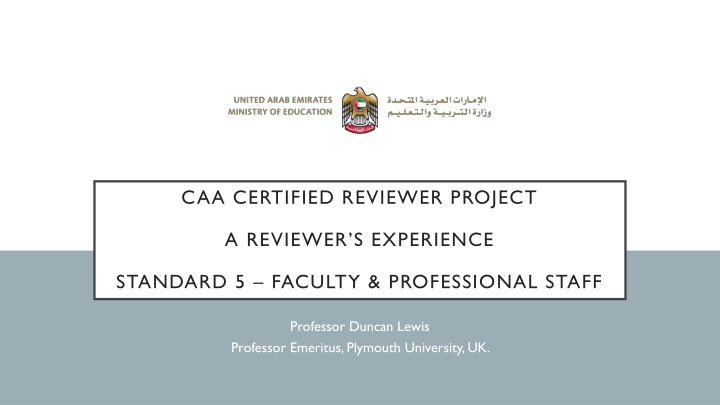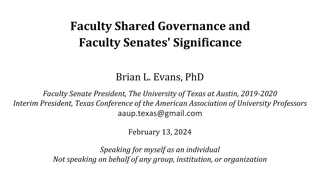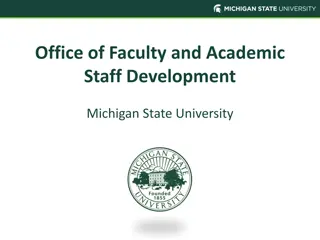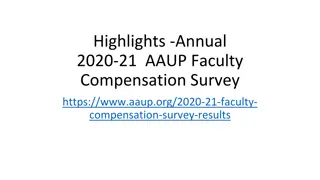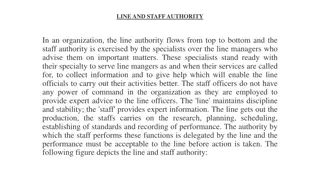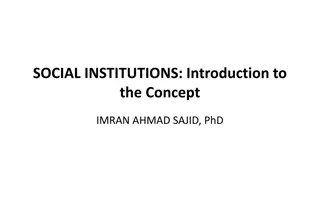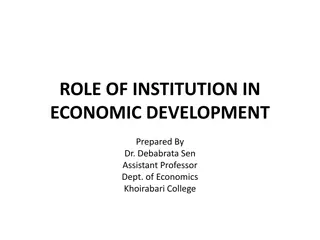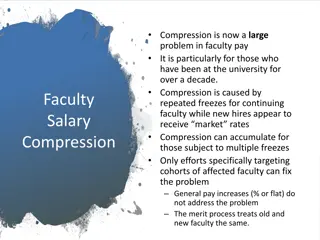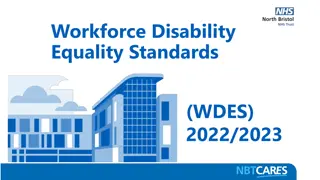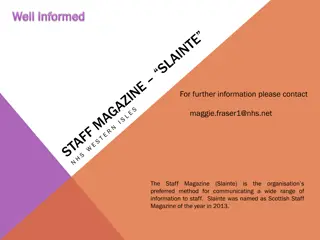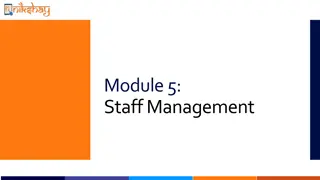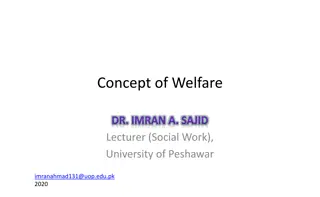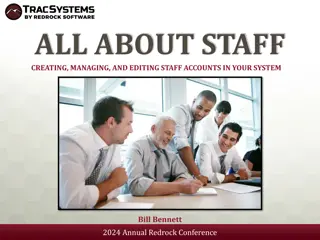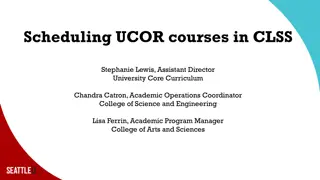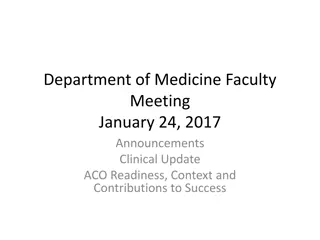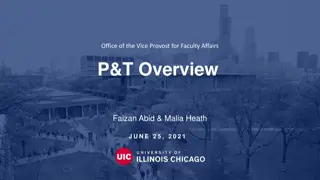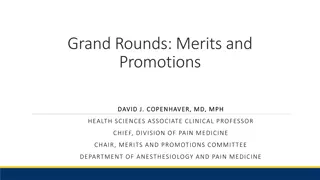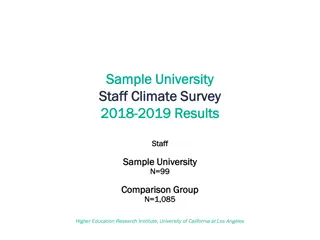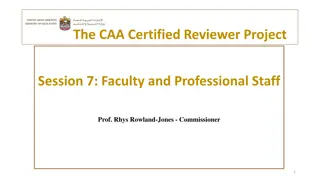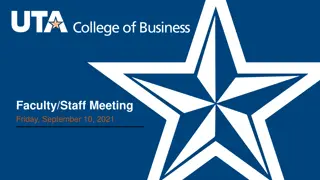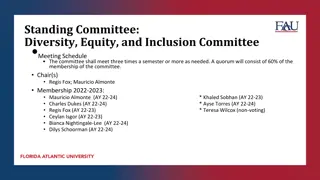Efficient Tips for Reviewing Faculty and Professional Staff in Educational Institutions
Enhance your reviewing skills by preparing thoroughly before site visits, maintaining confidentiality, and working collaboratively as part of an Education Review Team (ERT). Focus on unbiased assessment, meticulous document examination, and effective communication with fellow reviewers and institution representatives to ensure standards compliance. Prioritize understanding institutional documents, avoiding biases, and handling sensitive information responsibly.
Download Presentation

Please find below an Image/Link to download the presentation.
The content on the website is provided AS IS for your information and personal use only. It may not be sold, licensed, or shared on other websites without obtaining consent from the author.If you encounter any issues during the download, it is possible that the publisher has removed the file from their server.
You are allowed to download the files provided on this website for personal or commercial use, subject to the condition that they are used lawfully. All files are the property of their respective owners.
The content on the website is provided AS IS for your information and personal use only. It may not be sold, licensed, or shared on other websites without obtaining consent from the author.
E N D
Presentation Transcript
CAA CERTIFIED REVIEWER PROJECT A REVIEWER S EXPERIENCE STANDARD 5 FACULTY & PROFESSIONAL STAFF Professor Duncan Lewis Professor Emeritus, Plymouth University, UK.
This is a big section of the RPA/IPA report. You need to work as an ERT team more on this later. Do not be embarrassed to seek advice of fellow ERT, and the Commissioner(s) assigned to the review. This is a team approach. Important suspend any potential bias you may have including positive and negative biases. Be wary of Confirmation Bias and Stereotyping. Look at the facts/evidence only. STANDARD 5 FACULTY & PROFESSIONAL STAFF
Understand the institution by reading all docs (including annexes) and visiting their website. Your aim is to have a draft of the sections allocated to you BEFORE the visit commences. Do not underestimate the time or work involved. There is lots to get through. Your writing must reflect the evidence compliant or non-compliant with the Standards/IPA/RPA/QFEmirates. Your narrative must guide the institution. Keep questions back that you want answered and you can ask the Chair/Commissioner for guidance before the start of the visit. PRE SITE VISIT
Although supplied with documents prior to the visit, some of these will be out of date or missing. You will also want to conduct your own investigations when on-site. Personally, I like to look at course files in hard copy and generally prefer all docs in hard copy. However, ERT differ in their approach. My view is that I may ask for a document once or twice but if it is still not provided, I stop chasing. If this means it leads to a Requirement, then so be it. You cannot keep asking!! THE CHALLENGE OF DOCUMENTS Be wary of minutes you may have asked for. Ask for an electronic version and check the document properties. Ditto policy. Have these just been written?
Confidentiality (and honesty) are critical. You will be expected to discuss / share your observations, sometimes on sensitive matters. Any notes you have at the end of the review should be shredded in any shredder provided or handed to the Commissioner for her/him to destroy. Always check your base room at the end of a meeting leave nothing behind that you may have made notes on. WORKING AS A TEAM OF ERT Carry a notepad and pen with you on the campus tour or in meetings away from the base room.
VIRTUOUS CIRCLE Standards Compliance / Non- Compliance Policy Evidence Process
STANDARD 5 THE TRICKY BITS Faculty Workloads Professional Development /Evaluation Faculty qualifications Part-time faculty Graduate faculty
You must check a sample of faculty files carefully for completeness / compliance (5.4.4 and 5.4.5). If you find a single non-compliant faculty file in your sample, please check others broaden your sample. Critical that faculty qualifications are appropriate for the roles/fields they are employed in. STANDARD 5.4 FACULTY QUALS In my experience faculty qualifications are: sometimes not in the subject area they are teaching in not at the correct level e.g., do not hold a terminal degree when teaching degree programs, or sometimes when teaching at graduate levels. sometimes not from recognized HEI s Ask yourself, are there a sufficient number of faculty for the subject? A single subject expert cannot have their work appropriately moderated (Standard 3.10.4). Finally, remember the 20% rule (5.4.11)
Terminal degree in the subject/field is essential. Seek evidence of research outputs (e.g. Scopus) and scholarship. C.V. s often out of date ask for up-to-date C.V. s around 1-2 weeks prior to the review starting. Crosscheck C.V. s against journals/learned societies membership lists, ResearchGate and other portals to make sure claims made in C.V. s are substantiated. STANDARD 5.5 GRADUATE FACULTY Are supervisors appropriately qualified to supervise graduate students what is their research output showing? Are there enough faculty to supervise students and they must be full-time & experienced? Doctoral programs must evidence extensive record of research output by faculty for supervising doctoral candidates. Ignore research outputs in journals that require payment for publication. Look for multiple authorships from other institutional colleagues this leads to inflated claims of research productivity. Each faculty member must have their own research record.
Look at the workload model provided and make sure that it complies with workload policy. Does the workload model capture work other than teaching/supervision e.g., committees/service? Are workloads equitable? Who has taught the courses and does this match to the workload model? Are the maximum limits of Standard 5.7.4 complied with? STANDARD 5.7 FACULTY WORKLOAD Caution occasional paid overload such as covering for a sick colleague is acceptable, but routine overload is not. The institution must employ sufficient faculty for the program. Make sure those with management duties such as Dean/Chair/HoD receive workload compensations. Finally, and important in graduate programs, check that thesis/dissertation supervision workloads meet international norms and are mandated by policy.
Establish that part-time faculty are limited to no more than 25% of total faculty assigned to a given program. Need to ensure you have their C.V. s ask and keep asking for them. Are they research active - if it is a graduate program they must be. What do their faculty files show? Are they treated the same as FT faculty? If possible, include at least one part-time faculty in your interview sample. Interview online if you have to. Do part-time faculty have dedicated email/office space/desk? Is there a hot- desking practice in place? They must be provided for appropriately. STANDARD 5.8 PART-TIME FACULTY
If an institution says it spent 1,000,000 AED on training and development, you must seek the evidence. Ask for copies of training materials and dates of training. Cross check with faculty and staff that these happened. If a graduate program, what research training has taken place to keep faculty upskilled? STANDARD 5.10 PROFESSIONAL DEVELOPMENT Do not forget staff it is not just AED spending on faculty. Are there individual faculty budgets for professional development such as conference attendance, publishing in tier 1 or 2 Scopus journals? Any evidence of sabbaticals or workload reduction for those engaged with industry? Any evidence of research grants? What is the budget and how has this changed since the IA approval? A good institution will have a dossier of spending and how each training/professional development event supports KPI s and institutional mission/objectives.
You are looking for evidence that: A) Evaluations take place at least annually and; B) That evaluations are meaningful. Do the employee records show evidence of annual evaluations? If not, why not? STANDARD 5.12 EVALUATION What does policy and procedure show? Are there clear criteria and do these differ by faculty grade? Are the criteria fair and equitable? Finally, is there evidence of evaluation being used to address poor teaching and learning or lack of research productivity they should do. Crosscheck with course file reports and student evaluations!!!
Remember, there is a lot of work to get through when covering Standard 5. Chances are you will also be assigned other Standards too. As soon as you are accepted to a review, start the process of examining the evidence. Even an hour a night can enable you to check off certain things. FINAL THOUGHTS NEVER, EVER leave it until a review starts. You will never get through the documentation/interviewing and write up your report in time. I typically put in 3-4 full days of time prior to the commencement of a review. Finally, you are not alone so please ask for help/advice your fellow ERT will think more of you than if you produce a report that has failed to ask the right questions.
